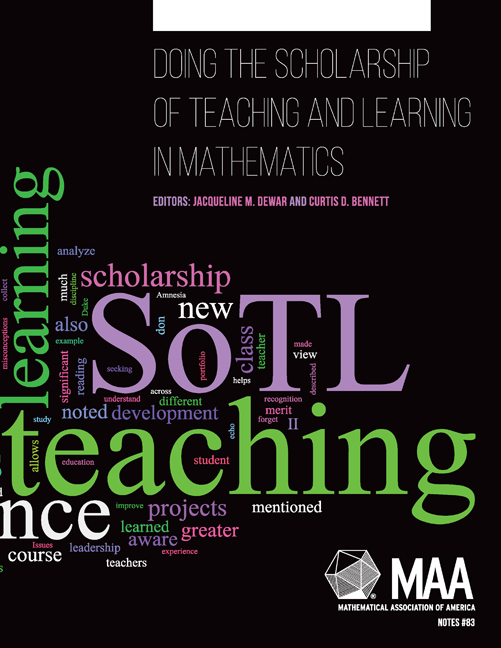Book contents
- Frontmatter
- Contents
- Foreword
- Preface
- Part I Getting Started in SoTL as a Mathematician
- Part II Illustrations of SoTL Work in Mathematics
- Theme 1: Experiments with Approaches to Teaching
- Theme 2: Crafting Learning Experiences around Real-World Data or Civic Engagement
- Theme 3: Using Assigned Reading Questions to Explore Student Understanding
- Theme 4: Exploring Student Understanding of the Nature of Mathematics
- Theme 5: Tackling Large Questions
- 18 The Question of Transfer: Investigating How Mathematics Contributes to a Liberal Education
- 19 Using SoTL Practices to Drive Curriculum Development
- Epilogue
- Index
19 - Using SoTL Practices to Drive Curriculum Development
from Theme 5: - Tackling Large Questions
- Frontmatter
- Contents
- Foreword
- Preface
- Part I Getting Started in SoTL as a Mathematician
- Part II Illustrations of SoTL Work in Mathematics
- Theme 1: Experiments with Approaches to Teaching
- Theme 2: Crafting Learning Experiences around Real-World Data or Civic Engagement
- Theme 3: Using Assigned Reading Questions to Explore Student Understanding
- Theme 4: Exploring Student Understanding of the Nature of Mathematics
- Theme 5: Tackling Large Questions
- 18 The Question of Transfer: Investigating How Mathematics Contributes to a Liberal Education
- 19 Using SoTL Practices to Drive Curriculum Development
- Epilogue
- Index
Summary
Editors' Commentary
In this chapter, Rikki Wagstrom describes how she applied SoTL processes to aid in the development and evaluation of a new curriculum that integrated civic issues into a prerequisite course for college algebra. Her experience illustrates how it can take a long time to identify and frame an appropriate research question. She describes searching the literature and tells how it led her to a useful model, one that prompted her to change the site of her investigation and revise her research question. She provides insights into the problems that can arise in finding faculty members to teach experimental and control sections, and the tough decisions that have to be made about how much data to collect.
Introduction
My SoTL journey originated with the 2006 Summer Institute sponsored by SENCER (Science Education for New Civic Engagements and Responsibilities, see sencer.net). SENCER, a National Science Foundation funded program, supports mathematics and science faculty in creating or modifying curriculum, pedagogies, and courses to integrate civic issues. When I attended the institute, the courses already developed through SENCER were mostly in the sciences; only a few were in mathematics. I returned to Metropolitan State University in St. Paul, Minnesota, inspired to design a SENCER mathematics course and curious about how using the SENCER approach would affect introductory-level courses such as developmental mathematics and college algebra, where low retention rates are a problem.
When I returned for the 2007 SENCER Summer Institute, I participated in a pre-institute workshop on the Scholarship of Teaching and Learning. Workshop participants began to develop a SoTL research question to investigate during the coming year and to report on the following summer. I started with many questions: Would teaching college algebra through a civic issue generate interest in mathematics? Would it improve students' ability to think about and use algebra sensibly? Would it better prepare them for future mathematics courses? To launch my SoTL project, I settled on the question: How does teaching algebra through civic issues affect students' abilities to apply appropriate mathematical arguments or tools to mathematics-related problems arising in their lives?
- Type
- Chapter
- Information
- Doing the Scholarship of Teaching and Learning in Mathematics , pp. 191 - 200Publisher: Mathematical Association of AmericaPrint publication year: 2014

